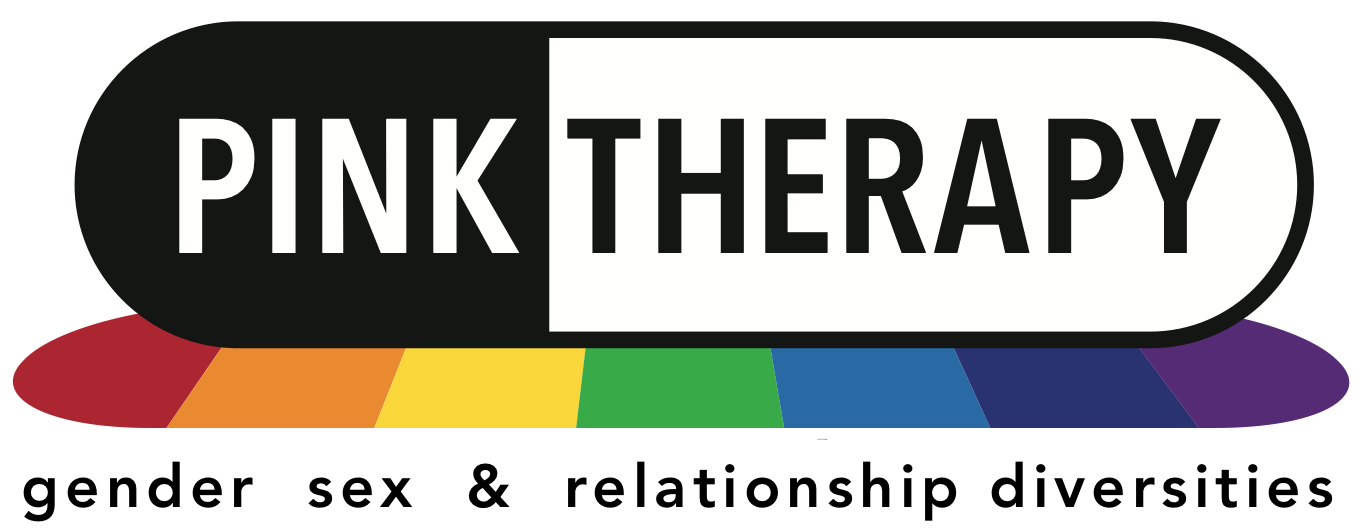Pink Therapy Diploma in Gender, Sex and Relationship Diversity (GSRD) Therapy
A year-long specialist training course exclusively for qualified mental health professionals focusing on working with therapy clients of diverse genders, sexualities, identities, relationships, lifestyles and practices. This can form part of psychotherapy training – the missing link for mental health professionals working with LGBTQIA+ clients.
FEBRUARY 2025
Please note: We are taking a period of reflection and redesigning our taught Diploma programme. Meanwhile, we welcome therapists to take our Advanced Certificate programme which comprises the same modules as the Diploma but ass a self-study programme.
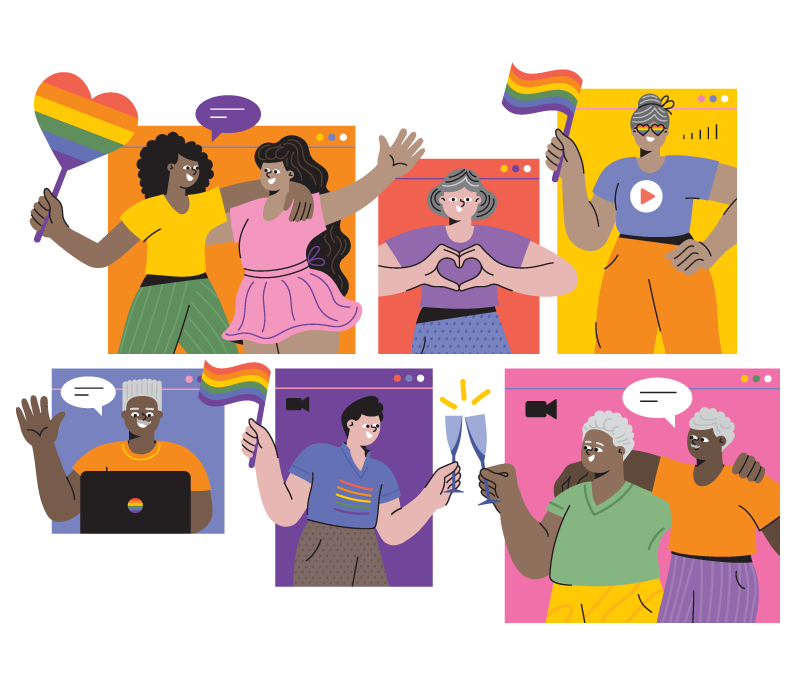
In this section
Too many mental health professionals feel lost, alone and completely stuck when it comes to supporting LGBTQIA+ clients
It’s such a surprising story. One that affects thousands of mental health professionals across the world. But if you want to learn more about therapy work with clients who identify as Lesbian, Gay, Bisexual, Trans, Queer, Intersex, Asexual, (LGBTQIA+) or other diverse sexualities, genders and relationship structures?
It’s really hard to find a comprehensive training programme out there. LGBTQIA+ issues might have got a brief mention during your formal training, if you happened to be one of the lucky few, but most students are left to fend for themselves.
A problem that is even more real and painful for mental health professionals in socially repressive countries or cultures. They tell us things like:
“As a gay therapist, I feel so isolated and alone.”
“I have no peer support in this. I’m second-guessing myself and worry I’m making the wrong decision.”
“I so WANT to provide the best care for every client, but I just don’t feel equipped to do so. I don’t understand what all these new identities mean, or how best to help my clients.”
“It makes me feel inadequate, and like I’m letting people down.”
If only there was an answer!
What we offer
Specialist education
Independent Validation
Faculty of experts
Diverse peers
100% online
Optional second year
An option to take up a second year of study to complete our Advanced Specialist Diploma in GSRD Psychotherapy.
A deep dive into GSRD Therapy
Our programme offers a comprehensive learning experience that integrates academic rigor, practical case study discussions and a dynamic international network. This unique blend is structured to nurture your development as a therapist who can effectively support the mental health of Gender, Sex, and Relationship Diverse (GSRD) clients.
Each component of the course is delivered by leading GSRD educators – renowned clinicians and dedicated professionals who bring both passion and expertise from their active roles within global LGBTQIA+ communities. Their teachings aim to inspire and challenge you, pushing the boundaries of your perspectives and professional capabilities.
You will emerge from this programme not only with a deeper understanding of diverse identities but also with the confidence and skills to enhance the wellbeing of the LGBTQIA+ community. This course is designed for efficiency, building clinical excellence and confidence with a clear, focused and externally validated educational journey.
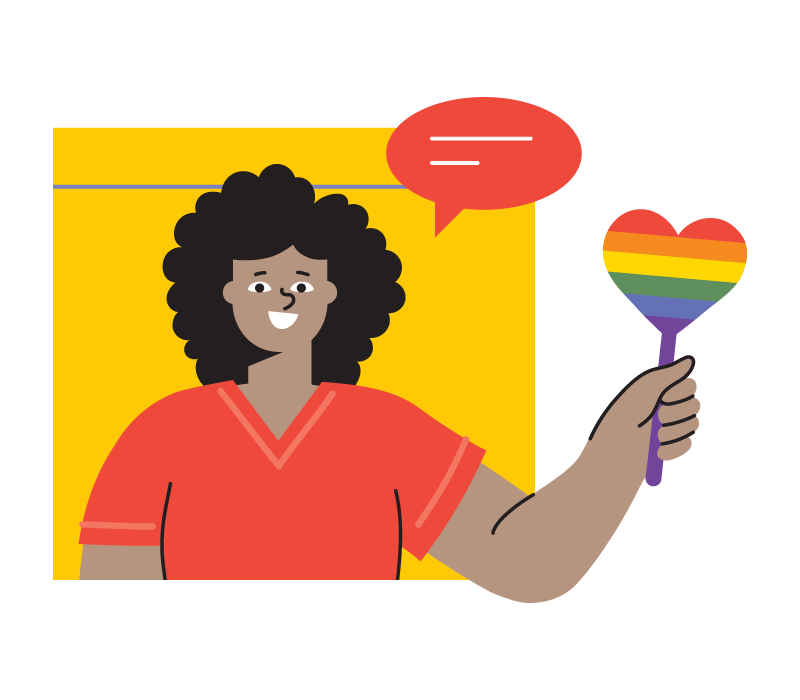
Independent verification
The Pink Therapy Diploma in GSRD Therapy has been given Advanced Specialist training recognition by the National Counselling and Psychotherapy Society (NCPS) and the National Council of Integrative Psychotherapists (NCIP) has accredited the Diploma as a level 6 training.
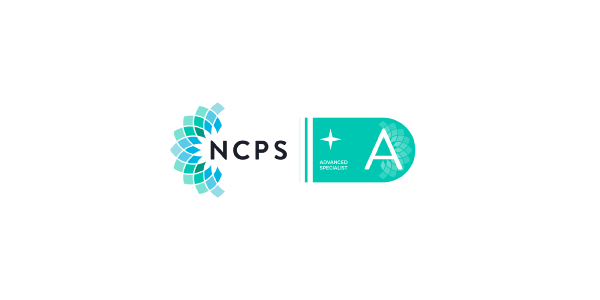
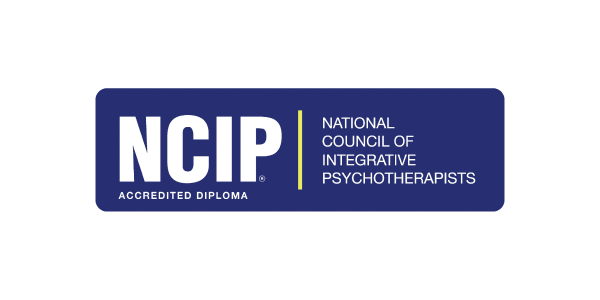
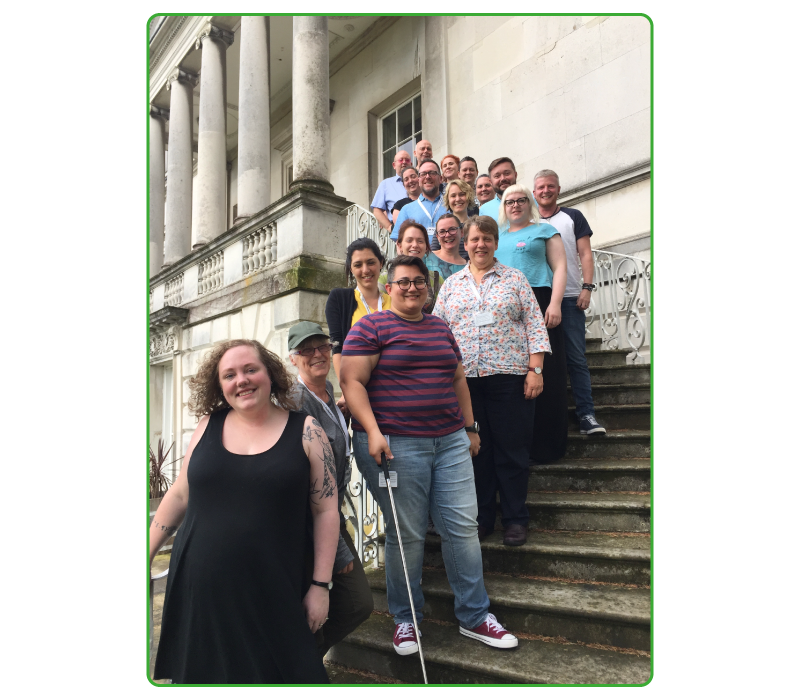
Sample Diploma course outline
Our Diploma in Gender, Sex and Relationship Diversity Therapy starts in July and spans twelve months, offering a robust and interactive learning experience through several components:
- Eight Theory Modules on GSRD Therapy: Delivered through video lectures and required readings, you’ll dive deep into various topics related to GSRD therapy. To ensure active learning, you’ll complete assessments to demonstrate understanding and reflection on how these insights apply to your therapeutic practice.
- Live Webinars: Following the submission of module worksheets, you’ll participate in 120-minute webinars hosted by subject experts. These sessions are designed to deepen your knowledge and integrate the topics into your clinical work.
- Regular Case Discussion Groups (CDGs): These monthly video conferences are a cornerstone of the programme, allowing you to engage in peer supervision and consultation. Each student will present case studies, fostering clinical excellence and diverse perspective-sharing.
- An Experiential Intensive: The programme includes a 10-day online intensive split into two five-day sessions. This part of the course focuses on experiential learning and community building, requiring participants to engage in intensive group work and personal reflection, enhancing both personal and professional growth.
This detailed structure ensures a comprehensive and dynamic approach to learning, preparing you to support the LGBTQIA+ community effectively as a skilled therapist.
Although the programme is taught online and you can set your own schedule for the theory modules and your assignments, this course will occupy a significant amount of your time.
We anticipate you will spend about 5-10 hours per week studying for this course.
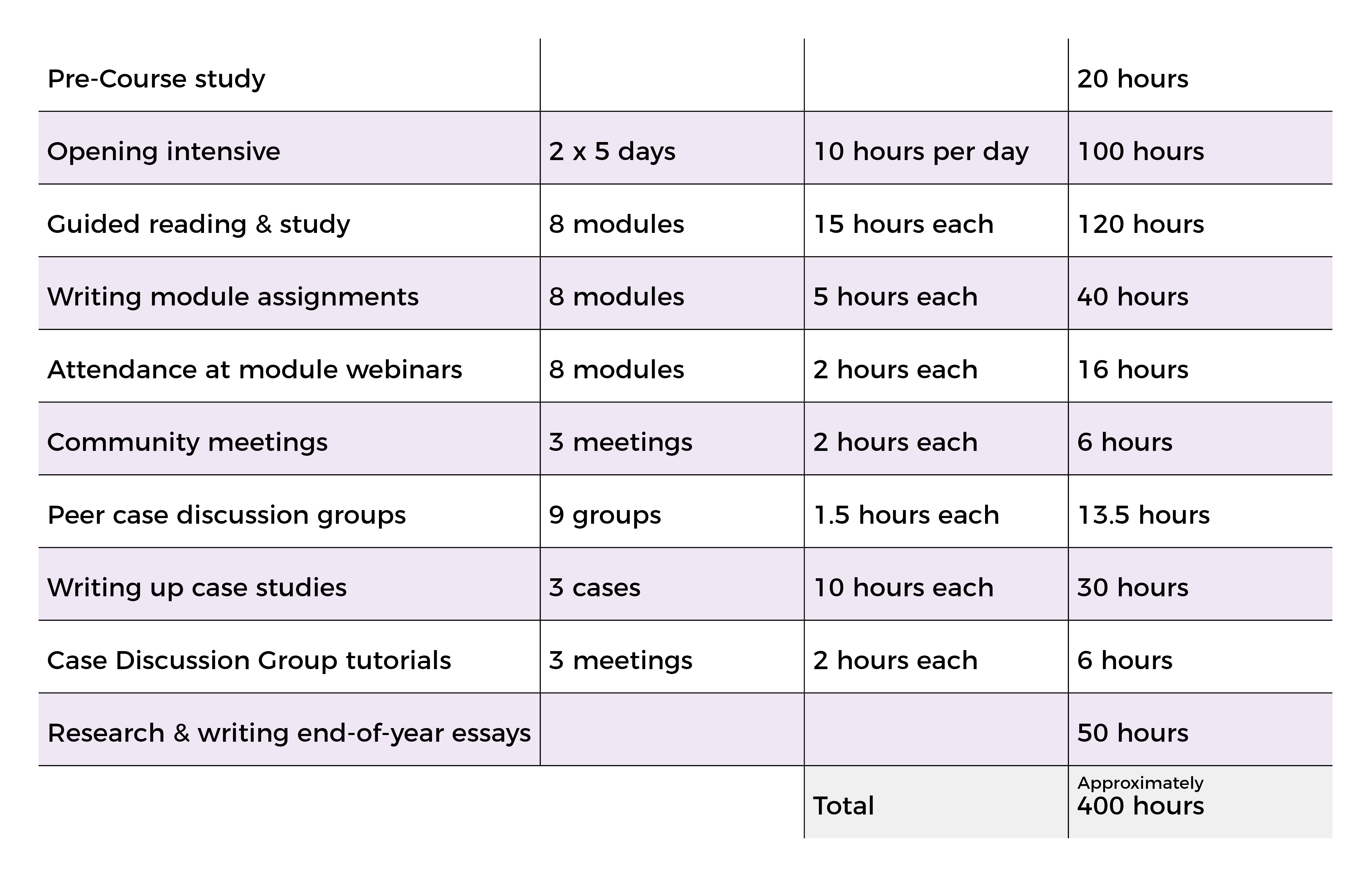
How much does the Diploma cost?
The fee for the Diploma in Gender, Sex and Relationship Diversity Therapy Programme starting in Summer 2024 is £3,600 (or equivalent in EUR). This is under review for the next cohort beginning in Summer 2025. When your application is successful, you will be offered a place. A £500 deposit (or equivalent in EUR) is payable when you accept our offer.
Pink Therapy has always had a commitment to capacity-building in disadvantaged groups who may be underrepresented in the counselling field. We will, therefore, be offering two of the 15 available places on the course at a 30% discount. There will be a bursary for a therapist who identifies as Trans and/or Non-Binary and another bursary for a Black, Asian or Minority Ethnic (BAME) therapist. Should you wish to apply for one of the two Bursary places, please write a personal statement about yourself and the impact you think the course will have on your career and contribution to the field. Please also write something about your financial situation. Please then attach your statement to the Application Form. We will award the Bursaries to those we deem to have the greatest need.
What people say about our Diploma course
I was trained as a psychotherapist and sex therapist but felt I lacked specific competences to work efficiently with GSRD clients.
The diploma gave me exactly what I was looking for. It should definitely be part of every mental health professional’s background.
The Diploma in Gender, Sex and Relationship Diversity Therapy programme is the first course that I have found to fully address the therapeutic needs of the GSRD community in both a reflective and comprehensive way.
Drawing on experts from the field, it covers the current ever-changing issues within this area whilst also providing an insight into the unique mental health challenges that face the GSRD community.
The most resounding aspect of the course for me is the gap it fills that exists for GSRD and ally practitioners in the form of a supportive therapeutic network of practitioners.
Long after the course has been completed, I know that this crucial, non-judgemental, reflective learning environment will stay with me in the form of GSRD practitioners that are both colleagues and friends.
For me, it has brought sexuality and gender into my work and practice, providing me with the confidence and knowledge to help educate others.
The Diploma in Gender, Sex and Relationship Diversity Therapy programme provided a framework and pathway in which to better support my Rainbow clients with their internal conflicts enabling them to hold and honour their respective identities.
The modules have added specialist knowledge to my counselling kete (basket) of resources in which one of my clients has conveyed: “It’s really good to be able to talk to someone who knows this stuff (GSRD) which helps me feel like you get me…”
I cannot speak highly enough about how the one year Diploma in Gender, Sex and Relationship Diversity Therapy programme has supported my ongoing personal and professional development in Counselling therapy. It is a challenging course and, given the much needed support for our Rainbow clients, well worth it!
As a therapist who has worked within GSRD communities for some time, a part of me wondered if I would gain enough from this, and whether it would be worth the time and cost commitment.
I found the residential week incredibly affirming of myself as a counsellor in these settings; I was challenged, and I learned things that I did not know about, and I came away for the first time with a strong sense of community. This sense of community has continued with frequent conversations with those in my residential and my learning has continued also.
For me the residential was an incredibly valuable experience and I would welcome the chance to return for another residential on this course!
The part that I enjoyed the most in the Diploma in Gender, Sex and Relationship Diversity Therapy programme was the Case Discussion Groups with my peers from different countries.
Not only did we share different clinical skills, perspectives, our own thoughts and feelings on each GSRD case, I’ve also gained insight into how culture plays a vital part in each GSRD individual.
I am very grateful that I could share what I experienced and learned in this course to other GSRD-friendly counsellors in Hong Kong.
I love teaching on this training because of the conversations I am privileged to have with practitioners coming from all over the world!
Despite our different geographical locations, we can come together to discuss how to best serve historically marginalized populations with expansive and diverse gender, sexual, relational and erotic orientations, identities and experiences.
As someone who has lived as an immigrant in two different countries and with a range of non-binary and liminal identities and experiences, I particularly appreciate this aspect of the training. Every webinar I teach is a delight and an opportunity to share what I know as well as to learn from insightful and passionate practitioners.
The Diploma in Gender, Sex and Relationship Diversity Therapy programme is the most innovative of its kind in the world.
It takes the pathology and stigma out of how people ‘do’ sex, and teaches clinicians what’s missing from compassionate conversations about sex, pleasure and GSRD relationships.
I am thrilled to contribute my somatic clinical expertise as part of this program.
I embarked on the diploma because I wanted training where I could bring my whole self. It has made me a better therapist with all my clients, not only the GSRD ones.
The personal development combined with the academic learning has been a deep dive, compared to feeling that I was so often paddling in the shallows.
The Diploma in Gender, Sex and Relationship Diversity Therapy programme was significantly richer in content than I had expected when I signed up. It has been challenging, rewarding and transformational for me personally and professionally.
The resources, expertise, module topics, structure and progressiveness affirmed and deepened my personal experiences and bolstered my professional practice.
From the very first module, I noticed the knowledge being useful and welcome in client sessions. Gender identities, and the Gender and Sexuality Conflicts modules, in particular, have deepened the awareness, education and support I can offer my clients in their journey to becoming whole. Highly recommended!
Pink Therapy’s given me an eye-opening and systematic view in therapy related to diverse sexuality, gender, and relationship, which is internationally absent in the current psychological education curriculum.
Instructors in the program are all experienced practitioners with a profound theory base.
[Not to mention, my excellent cohort from various countries have broadened my understanding of psychology and counselling under different country contexts]
INTERNATIONALITY
I have got involved in Pink Therapy courses to share my experience but also to find a supportive field of international connections with people who – like me – are deeply interested in gender, sexuality, sex and relationships issues.
I have learnt that we see and understand these issues differently in different parts of the globe. Those differences arouse a myriad of thoughts and feelings in me. Pink Therapy is a beautiful container for all of that.
